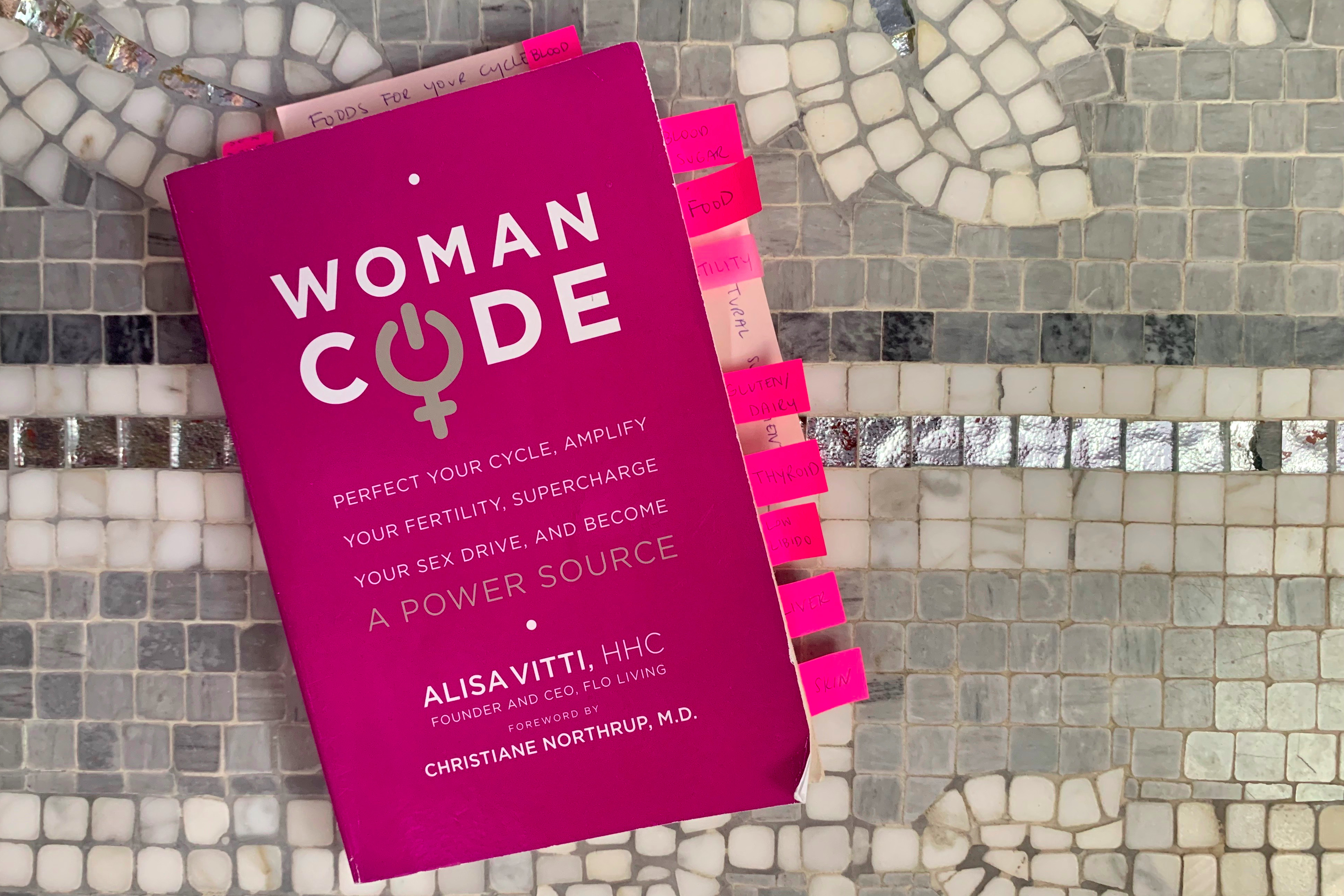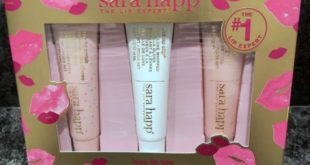
PCOS, or Polycystic Ovarian Syndrome, is a hormonal condition defined by irregular or missed periods, acne, tiredness, insomnia, low mood, sugar cravings, lack of orgasms, and poor digestion. It… sucks. I know, because I have it. And since the symptoms might not seem related to each other at first, it’s tricky to diagnose and treat. As common as PCOS is (one in eight women of reproductive age might actually suffer from it), remedies are rarely talked about in mainstream wellness—instead, a quick-fix is achieved with spironolactone or birth control. I went that route too, until I discovered Woman Code.
Woman Code is like my version of the traveling pants. The little purple book is brimming with so much information I’ve circled it among all my friends who menstruate. Its author, Alisa Vitti, is a functional nutrition and women’s hormone expert who made it her life’s mission to empower women with the information to assuage their symptoms at home. Am I obsessed with her? Maybe. But it’s only because she quite literally spearheaded the movement of treating PCOS naturally, without medication, all from her own experience. (With skin as luminous as an old masters painting, you would never guess that Vitti suffered from PCOS-related acne for seven years.) Through her FLO Living Center in NYC, podcasts, blog, YouTube channel, and app, Vitti’s constantly sharing new tips for how to alleviate PCOS symptoms with lifestyle changes.
Still, the book is considered the ultimate bible—that is, if you have the patience to actually read it. I get it! A nonfiction nutrition book isn’t exactly a page-turner! It’s why I shared major takeaways from my highlighted, Post-It-riddled, and scribbled up copy below. Let’s start at chapter one.
Stabilize your blood sugar
It’s the first chapter of the book for good reason: stabilizing your blood sugar is the absolute first step to balancing your hormones through lifestyle alone. That’s because your entire endocrine system is influenced by how much sugar you consume. Your body produces insulin to balance high blood sugar levels—a diet with too much sugar can lead to insulin resistance, which is when your body makes insulin but can’t use it effectively. A high-sugar diet even increases the risk for more testosterone production, weight gain and Type 2 diabetes. To keep your sugar low, Vitti doesn’t suggest anything crazy. Start with a cup of water first thing in the morning and, ideally, an AM number two. Instead of a morning cup of coffee or green tea (caffeine on an empty stomach elevates blood sugar and stimulates the stress hormone cortisol), make yourself breakfast with a healthy protein and fat like eggs, smoked fish, or avocado. Later in the day, indulge in complex carbs that support healthy liver function alongside high-fiber green vegetables and lean protein. If you’re ready for a bigger lifestyle change, cut out all processed and artificial sugars and fill up on whole grains instead of refined carbohydrates. One of my favorites is buckwheat, which actually improves the body’s sensitivity to insulin thanks to a naturally-occuring compound called inositol.
Steer clear of environmental determinants
Eliminating endocrine disrupting chemicals is the second step. But fair warning, it’s a little complicated. As Vitti re-emphasizes on her website, endocrine disruptors “confuse the hormonal conversation your body needs to have to create balance and avoid symptoms.” They might also make it more difficult for your body to process and eliminate extra hormones in your body. While everyone should do what makes them most comfortable in their own homes, you should be aware that household cleaning products, pesticides used on produce, and acne-fighting antibiotics can disrupt your body’s natural hormones. This is worth doing more research into and bringing up with your doctor.
Nurture your adrenals
Your adrenal glands are unable to keep up with the demands of perpetual fight-or-flight arousal that comes with chronic stress. While blood tests might not detect adrenal fatigue, your body sure can: body aches, fatigue, nervousness, period pain, sleep disturbances and digestive problems are adrenal fatigue symptoms, and also the most exasperating symptoms of PCOS. Vitti suggests low impact body movement, gentle and shorter exercises, and enough sleep to help keep your stress levels low. Another underlying cause of an adrenal problem could be a problem in the gut, as chronic stress drives cortisol up and weakens gut immunity. To give your gut some good TLC, turn to a daily probiotic, as well as B vitamins, zinc, omega 3 fatty acids, and vitamin D3. From experience, with these daily vitamins you’ll have no use for a Midol capsule.
Support your organs of elimination
Did you know the skin is your body’s largest organ of elimination? It handles what the large intestine and liver are unable to eliminate, and it excretes waste through sweat. Alternate hot and cold water while showering, and exfoliate with a hot washcloth a few times a week to remove buildup of dead skin, allowing your pores to detox through sweating. Have three minutes to burn? Vitti is a fan of jumping on a trampoline, which provides a gentle massage to the lymphatic system, is more fun than Chloe Ting, and won’t disturb your downstairs neighbors.
Synchronize your hormones
The coolest part of the book by far focuses on how to maintain cyclical harmony by mapping your food, lifestyle, and even physical activity against each menstrual phase. Let me explain. The first week of your cycle is the follicular phase. In the follicular phase, your body produces less hormones and you experience more energy. This is the best time to sign up for a high-intensity exercise class, start a work project, or snack on fresh, vibrant foods. During the ovulatory phase, the body produces a high amount of estrogen. This makes you feel a little bit more social and receptive to others—Vitti explains your higher-than-usual estrogen will make you even more magnetic, so it’s an ideal time to go on a first date. As energy declines in the luteal phase and PMS symptoms develop, go for foods rich in vitamin B like whole grains and protein to curb sugar cravings and keep energy up. After all of that, menstruation happens! This last and most fun phase leaves you with a drop of estrogen, which Vitti insists is as good a reason as any to cancel plans.
If there’s one final takeaway from the book, it’s this: slow down, connect inwards, and let your body be a guide. Just in case it doesn’t give me the best directions, I’m just going to keep my copy of Woman Code on-hand.
—Caroline Dweck
Photo via ITG



